初中英语语法---状语从句小结知识交流
- 格式:doc
- 大小:47.50 KB
- 文档页数:10
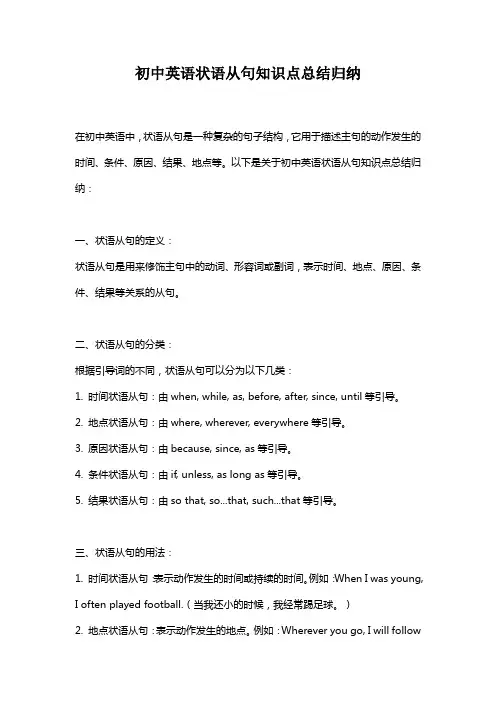
初中英语状语从句知识点总结归纳在初中英语中,状语从句是一种复杂的句子结构,它用于描述主句的动作发生的时间、条件、原因、结果、地点等。
以下是关于初中英语状语从句知识点总结归纳:一、状语从句的定义:状语从句是用来修饰主句中的动词、形容词或副词,表示时间、地点、原因、条件、结果等关系的从句。
二、状语从句的分类:根据引导词的不同,状语从句可以分为以下几类:1. 时间状语从句:由when, while, as, before, after, since, until等引导。
2. 地点状语从句:由where, wherever, everywhere等引导。
3. 原因状语从句:由because, since, as等引导。
4. 条件状语从句:由if, unless, as long as等引导。
5. 结果状语从句:由so that, so...that, such...that等引导。
三、状语从句的用法:1. 时间状语从句:表示动作发生的时间或持续的时间。
例如:When I was young,I often played football.(当我还小的时候,我经常踢足球。
)2. 地点状语从句:表示动作发生的地点。
例如:Wherever you go, I will followyou.(无论你去哪里,我都会跟着你。
)3. 原因状语从句:表示动作发生的原因。
例如:As it was raining, we had to stay indoors.(因为下雨了,我们不得不呆在室内。
)4. 条件状语从句:表示动作发生的条件。
例如:If it snows tomorrow, we will not go out.(如果明天下雪,我们就不出去了。
)5. 结果状语从句:表示动作发生的结果。
例如:She worked hard so that she could pass the exam.(她努力学习以便能通过考试。
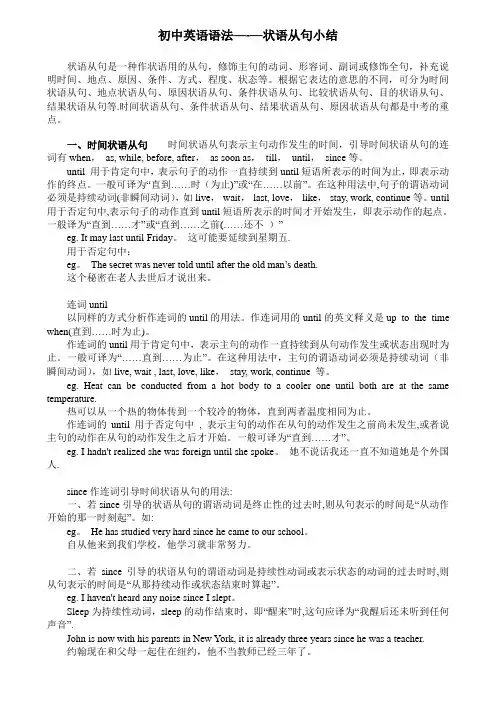
初中英语语法—-—状语从句小结状语从句是一种作状语用的从句,修饰主句的动词、形容词、副词或修饰全句,补充说明时间、地点、原因、条件、方式、程度、状态等。
根据它表达的意思的不同,可分为时间状语从句、地点状语从句、原因状语从句、条件状语从句、比较状语从句、目的状语从句、结果状语从句等.时间状语从句、条件状语从句、结果状语从句、原因状语从句都是中考的重点。
一、时间状语从句时间状语从句表示主句动作发生的时间,引导时间状语从句的连词有when,as, while, before, after,as soon as,till,until,since等。
until 用于肯定句中,表示句子的动作一直持续到until短语所表示的时间为止,即表示动作的终点。
一般可译为“直到……时(为止)”或“在……以前”。
在这种用法中,句子的谓语动词必须是持续动词(非瞬间动词),如live,wait,last, love,like,stay, work, continue等。
until 用于否定句中,表示句子的动作直到until短语所表示的时间才开始发生,即表示动作的起点。
一般译为“直到……才”或“直到……之前(……还不)”eg. It may last until Friday。
这可能要延续到星期五.用于否定句中:eg。
The secret was never told until after the old man’s death.这个秘密在老人去世后才说出来。
连词until以同样的方式分析作连词的until的用法。
作连词用的until的英文释义是up to the time when(直到……时为止)。
作连词的until用于肯定句中,表示主句的动作一直持续到从句动作发生或状态出现时为止。
一般可译为“……直到……为止”。
在这种用法中,主句的谓语动词必须是持续动词(非瞬间动词),如live, wait , last, love, like,stay, work, continue 等。
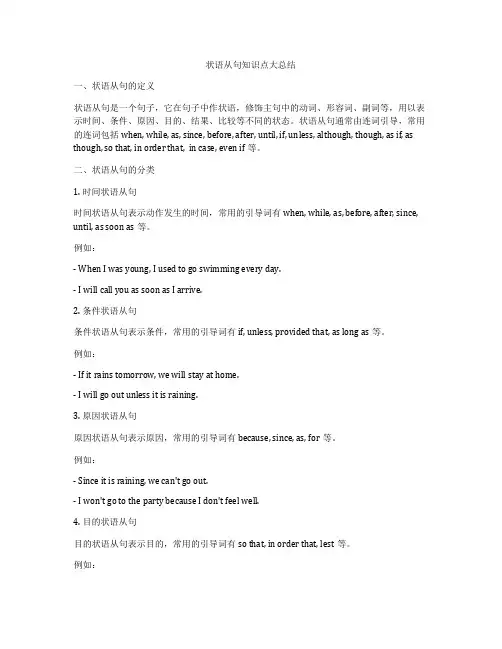
状语从句知识点大总结一、状语从句的定义状语从句是一个句子,它在句子中作状语,修饰主句中的动词、形容词、副词等,用以表示时间、条件、原因、目的、结果、比较等不同的状态。
状语从句通常由连词引导,常用的连词包括when, while, as, since, before, after, until, if, unless, although, though, as if, as though, so that, in order that, in case, even if等。
二、状语从句的分类1. 时间状语从句时间状语从句表示动作发生的时间,常用的引导词有when, while, as, before, after, since, until, as soon as等。
例如:- When I was young, I used to go swimming every day.- I will call you as soon as I arrive.2. 条件状语从句条件状语从句表示条件,常用的引导词有if, unless, provided that, as long as等。
例如:- If it rains tomorrow, we will stay at home.- I will go out unless it is raining.3. 原因状语从句原因状语从句表示原因,常用的引导词有because, since, as, for等。
例如:- Since it is raining, we can't go out.- I won't go to the party because I don't feel well.4. 目的状语从句目的状语从句表示目的,常用的引导词有so that, in order that, lest等。
例如:- I study hard so that I can get a good job.- We left early in order that we might avoid the traffic.5. 结果状语从句结果状语从句表示结果,常用的引导词有so...that, such...that等。
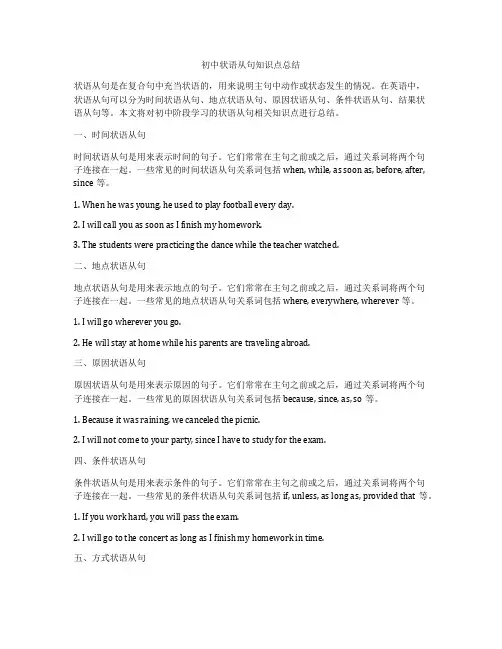
初中状语从句知识点总结状语从句是在复合句中充当状语的,用来说明主句中动作或状态发生的情况。
在英语中,状语从句可以分为时间状语从句、地点状语从句、原因状语从句、条件状语从句、结果状语从句等。
本文将对初中阶段学习的状语从句相关知识点进行总结。
一、时间状语从句时间状语从句是用来表示时间的句子。
它们常常在主句之前或之后,通过关系词将两个句子连接在一起。
一些常见的时间状语从句关系词包括when, while, as soon as, before, after, since等。
1. When he was young, he used to play football every day.2. I will call you as soon as I finish my homework.3. The students were practicing the dance while the teacher watched.二、地点状语从句地点状语从句是用来表示地点的句子。
它们常常在主句之前或之后,通过关系词将两个句子连接在一起。
一些常见的地点状语从句关系词包括where, everywhere, wherever等。
1. I will go wherever you go.2. He will stay at home while his parents are traveling abroad.三、原因状语从句原因状语从句是用来表示原因的句子。
它们常常在主句之前或之后,通过关系词将两个句子连接在一起。
一些常见的原因状语从句关系词包括because, since, as, so等。
1. Because it was raining, we canceled the picnic.2. I will not come to your party, since I have to study for the exam.四、条件状语从句条件状语从句是用来表示条件的句子。
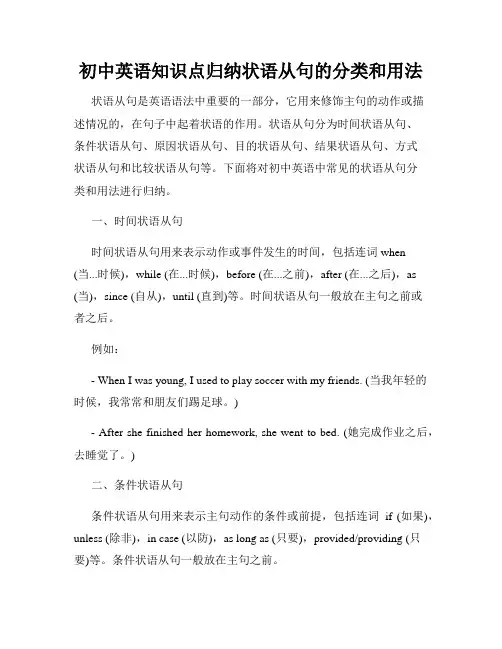
初中英语知识点归纳状语从句的分类和用法状语从句是英语语法中重要的一部分,它用来修饰主句的动作或描述情况的,在句子中起着状语的作用。
状语从句分为时间状语从句、条件状语从句、原因状语从句、目的状语从句、结果状语从句、方式状语从句和比较状语从句等。
下面将对初中英语中常见的状语从句分类和用法进行归纳。
一、时间状语从句时间状语从句用来表示动作或事件发生的时间,包括连词when (当...时候),while (在...时候),before (在...之前),after (在...之后),as (当),since (自从),until (直到)等。
时间状语从句一般放在主句之前或者之后。
例如:- When I was young, I used to play soccer with my friends. (当我年轻的时候,我常常和朋友们踢足球。
)- After she finished her homework, she went to bed. (她完成作业之后,去睡觉了。
)二、条件状语从句条件状语从句用来表示主句动作的条件或前提,包括连词if (如果),unless (除非),in case (以防),as long as (只要),provided/providing (只要)等。
条件状语从句一般放在主句之前。
例如:- If it rains tomorrow, we will stay at home. (如果明天下雨,我们就在家呆着。
)- Unless you work hard, you won't pass the exam. (除非你努力学习,否则你就不能通过考试。
)三、原因状语从句原因状语从句用来表示主句动作或情况的原因,包括连词because (因为),as (因为),since (因为),for (因为),now that (既然)等。
原因状语从句一般放在主句之前。
例如:- Because it was raining, we stayed at home. (因为下雨,我们呆在家里。
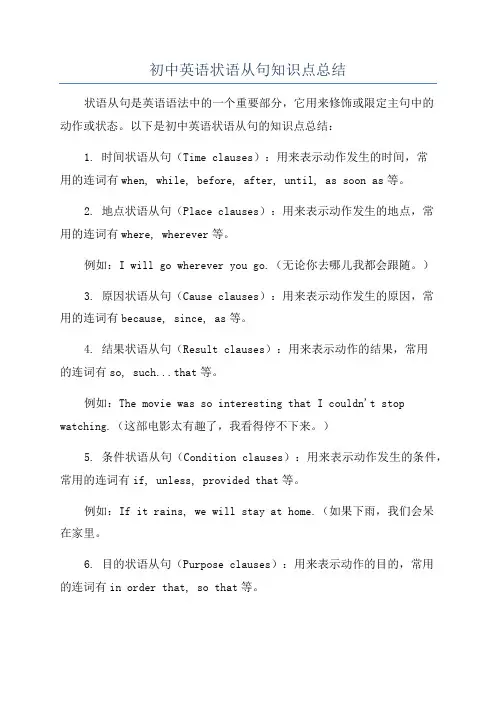
初中英语状语从句知识点总结状语从句是英语语法中的一个重要部分,它用来修饰或限定主句中的动作或状态。
以下是初中英语状语从句的知识点总结:1. 时间状语从句(Time clauses):用来表示动作发生的时间,常用的连词有when, while, before, after, until, as soon as等。
2. 地点状语从句(Place clauses):用来表示动作发生的地点,常用的连词有where, wherever等。
例如:I will go wherever you go.(无论你去哪儿我都会跟随。
)3. 原因状语从句(Cause clauses):用来表示动作发生的原因,常用的连词有because, since, as等。
4. 结果状语从句(Result clauses):用来表示动作的结果,常用的连词有so, such...that等。
例如:The movie was so interesting that I couldn't stop watching.(这部电影太有趣了,我看得停不下来。
)5. 条件状语从句(Condition clauses):用来表示动作发生的条件,常用的连词有if, unless, provided that等。
例如:If it rains, we will stay at home.(如果下雨,我们会呆在家里。
6. 目的状语从句(Purpose clauses):用来表示动作的目的,常用的连词有in order that, so that等。
例如:I bought a new notebook so that I can take notes in class.(我买了一个新笔记本,这样我可以在课堂上记笔记。
)7. 方式状语从句(Manner clauses):用来表示动作发生的方式,常用的连词有as, as if, as though等。
例如:He speaks as if he knows everything.(他说话的样子就像他什么都知道。
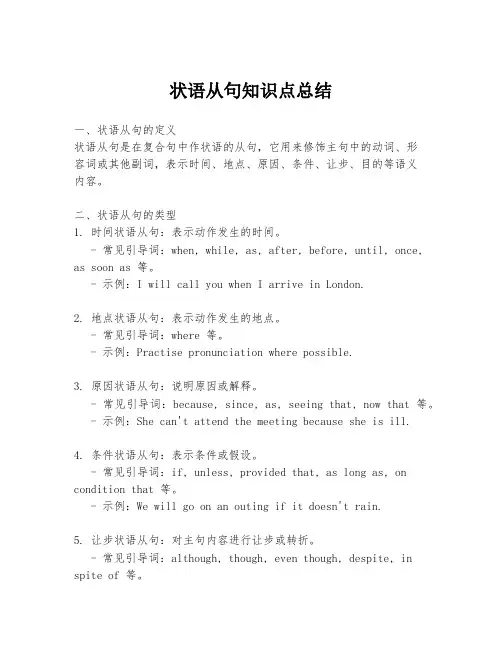
状语从句知识点总结一、状语从句的定义状语从句是在复合句中作状语的从句,它用来修饰主句中的动词、形容词或其他副词,表示时间、地点、原因、条件、让步、目的等语义内容。
二、状语从句的类型1. 时间状语从句:表示动作发生的时间。
- 常见引导词:when, while, as, after, before, until, once, as soon as 等。
- 示例:I will call you when I arrive in London.2. 地点状语从句:表示动作发生的地点。
- 常见引导词:where 等。
- 示例:Practise pronunciation where possible.3. 原因状语从句:说明原因或解释。
- 常见引导词:because, since, as, seeing that, now that 等。
- 示例:She can't attend the meeting because she is ill.4. 条件状语从句:表示条件或假设。
- 常见引导词:if, unless, provided that, as long as, on condition that 等。
- 示例:We will go on an outing if it doesn't rain.5. 让步状语从句:对主句内容进行让步或转折。
- 常见引导词:although, though, even though, despite, in spite of 等。
- 示例:Despite the bad weather, we went for a walk.6. 目的状语从句:表示目的。
- 常见引导词:so that, in order that 等。
- 示例:He gets up early so that he can catch the first bus.7. 结果状语从句:表示结果。
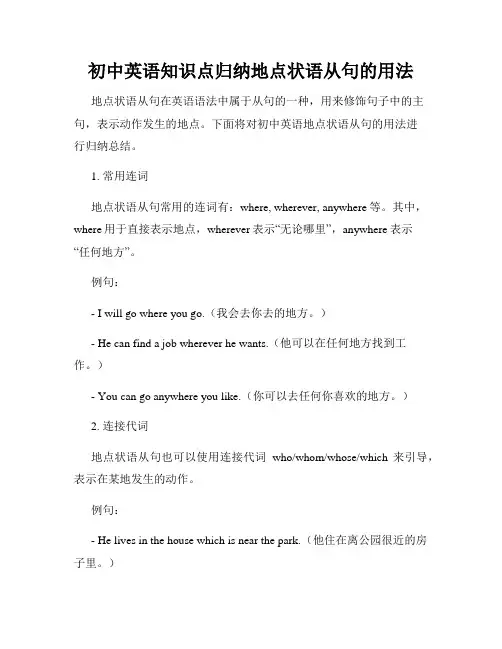
初中英语知识点归纳地点状语从句的用法地点状语从句在英语语法中属于从句的一种,用来修饰句子中的主句,表示动作发生的地点。
下面将对初中英语地点状语从句的用法进行归纳总结。
1. 常用连词地点状语从句常用的连词有:where, wherever, anywhere等。
其中,where用于直接表示地点,wherever表示“无论哪里”,anywhere表示“任何地方”。
例句:- I will go where you go.(我会去你去的地方。
)- He can find a job wherever he wants.(他可以在任何地方找到工作。
)- You can go anywhere you like.(你可以去任何你喜欢的地方。
)2. 连接代词地点状语从句也可以使用连接代词who/whom/whose/which来引导,表示在某地发生的动作。
例句:- He lives in the house which is near the park.(他住在离公园很近的房子里。
)- They went to the village where their grandparents lived.(他们去了祖父母生活的村庄。
)3. 介词+关系代词地点状语从句还可以使用介词+关系代词的形式来引导,具体使用哪种形式取决于介词在句中的作用。
例句:- This is the school in which I graduated.(这是我毕业的学校。
)- The street on which he lives is very busy.(他住的街道很繁忙。
)4. 时态地点状语从句的时态通常与主句保持一致。
如果主句是现在时态,则从句也使用现在时态;如果主句是过去时态,则从句使用过去时态。
例句:- I will meet you where we agreed tomorrow.(明天我会在我们约定的地方见你。
)(主句为将来时态)- He met her where they had first met.(他在他们初次见面的地方见到了她。
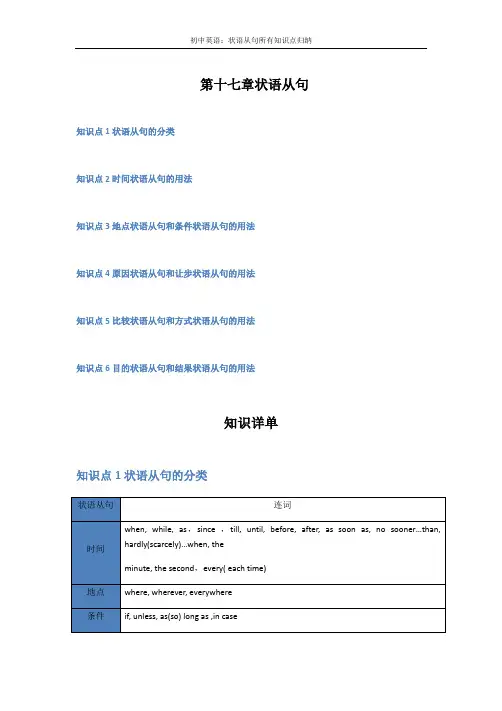
第十七章状语从句知识点1状语从句的分类知识点2时间状语从句的用法知识点3地点状语从句和条件状语从句的用法知识点4原因状语从句和让步状语从句的用法知识点5比较状语从句和方式状语从句的用法知识点6目的状语从句和结果状语从句的用法知识详单知识点1状语从句的分类知识点2时间状语从句的用法知识点3地点状语从句和条件状语从句的用法知识点4原因状语从句和让步状语从句的用法知识点5比较状语从句和方式状语从句的用法知识点6目的状语从句和结果状语从句的用法考点突破考点1考查时间状语从句的用法1.(龙东中考)-Henry, please call us as soon as you _______ Hawaii.-OK. I'll do that, Mom.A. arrive inB. are arriving inC. will arrive at【解析】选择A as soon as结构意为“一……就……,”引导时间状讲从句,主句为祈使句,从句用一般现在时表示将来。
Hawaii 为大地点.因此用in.考点2考查地点状语从句的用法2.(扬州中考)-My friend has achieved his goal after years of hard work.--- Great.A·One tree can make a forest B. Where there is a will,there is a way C. Many hands make light work D. A friend in need is a friend indeed【解析】选B 第一个人阐述自己的朋友经过多年努力实现目标.,第二个人表示祝贺,同时,发表自己对此事的看法。
应该是“有志者,事竟成”.该句是where引导的地点状语从句。
考点3考查条件状语从句的用法3.(十堰中考)_________ deal with our problems, we can easily become unhappy.A. UntilB. IfC. UnlessD. Though【解析】选C。
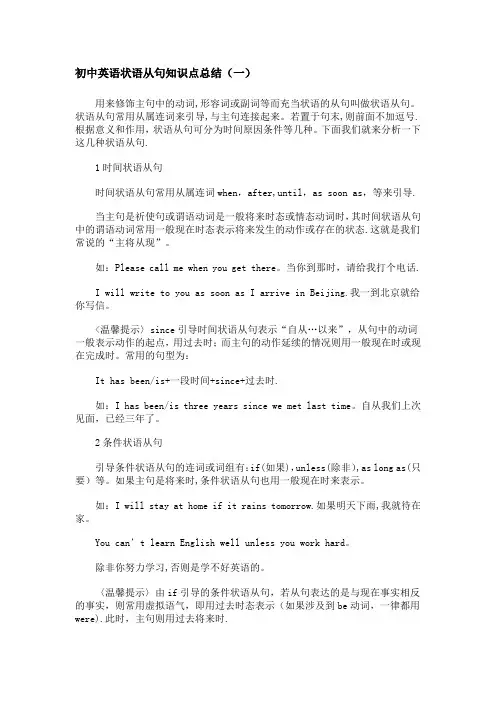
初中英语状语从句知识点总结(一)用来修饰主句中的动词,形容词或副词等而充当状语的从句叫做状语从句。
状语从句常用从属连词来引导,与主句连接起来。
若置于句末,则前面不加逗号.根据意义和作用,状语从句可分为时间原因条件等几种。
下面我们就来分析一下这几种状语从句.1时间状语从句时间状语从句常用从属连词when,after,until,as soon as,等来引导.当主句是祈使句或谓语动词是一般将来时态或情态动词时,其时间状语从句中的谓语动词常用一般现在时态表示将来发生的动作或存在的状态.这就是我们常说的“主将从现”。
如:Please call me when you get there。
当你到那时,请给我打个电话.I will write to you as soon as I arrive in Beijing.我一到北京就给你写信。
<温馨提示〉since引导时间状语从句表示“自从…以来”,从句中的动词一般表示动作的起点,用过去时;而主句的动作延续的情况则用一般现在时或现在完成时。
常用的句型为:It has been/is+一段时间+since+过去时.如:I has been/is three years since we met last time。
自从我们上次见面,已经三年了。
2条件状语从句引导条件状语从句的连词或词组有:if(如果),unless(除非),as long as(只要)等。
如果主句是将来时,条件状语从句也用一般现在时来表示。
如:I will stay at home if it rains tomorrow.如果明天下雨,我就待在家。
You can’t learn English well unless you wo rk hard。
除非你努力学习,否则是学不好英语的。
〈温馨提示〉由if引导的条件状语从句,若从句表达的是与现在事实相反的事实,则常用虚拟语气,即用过去时态表示(如果涉及到be动词,一律都用were).此时,主句则用过去将来时.如:If I had enough money,I would buy it for you。
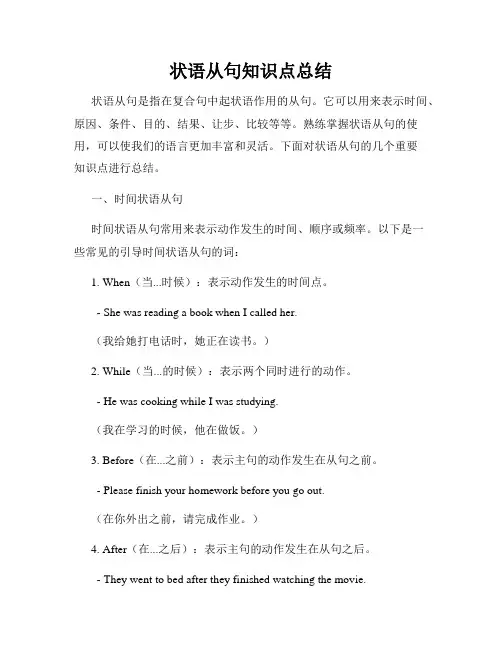
状语从句知识点总结状语从句是指在复合句中起状语作用的从句。
它可以用来表示时间、原因、条件、目的、结果、让步、比较等等。
熟练掌握状语从句的使用,可以使我们的语言更加丰富和灵活。
下面对状语从句的几个重要知识点进行总结。
一、时间状语从句时间状语从句常用来表示动作发生的时间、顺序或频率。
以下是一些常见的引导时间状语从句的词:1. When(当...时候):表示动作发生的时间点。
- She was reading a book when I called her.(我给她打电话时,她正在读书。
)2. While(当...的时候):表示两个同时进行的动作。
- He was cooking while I was studying.(我在学习的时候,他在做饭。
)3. Before(在...之前):表示主句的动作发生在从句之前。
- Please finish your homework before you go out.(在你外出之前,请完成作业。
)4. After(在...之后):表示主句的动作发生在从句之后。
- They went to bed after they finished watching the movie.(他们在看完电影之后就去睡觉了。
)二、原因状语从句原因状语从句常用来表示某个动作的原因或理由。
以下是一些常见的引导原因状语从句的词:1. Because(因为):表示直接的原因。
- I didn't go to the party because I was tired.(我因为累所以没有参加聚会。
)2. Since(因为):表示已知的事实或理由。
- He was absent from work since he was not feeling well.(他因病缺勤了。
)3. As(因为):表示两个动作同时发生,前者是后者发生的原因。
- I couldn't hear the speaker as the music was too loud.(由于音乐声音太大,我听不到演讲者的声音。
状语从句知识点总结
引导词:状语从句通常由连词(如when, while, as, before, after, since等)引导,也可以由词组引导。
这些连词在状语从句中起到连接句子的作用,使得状语从句的用法更加灵活多样。
位置:状语从句可以出现在主句之前、之中或之后,根据需要可以进行灵活的调整。
从句位于句首或句中时通常用逗号与主句隔开,位于句尾时可以不用逗号隔开。
时态:状语从句的时态通常与主句的动作发生时间一致或早于主句的动作发生时间。
例如,时间和条件状语从句的谓语动词一般用“一般现在时”表示“一般将来时”,用“现在完成时”表示“将来完成时”。
语序:在状语从句中,语序可以根据需要灵活调整。
种类:
时间状语从句:用来修饰主句所表示的动作或者状态发生的时间。
条件状语从句:表示主句的动作发生的条件。
原因状语从句:表示主句动作发生的原因。
目的状语从句:表示主句动作的目的。
结果状语从句:表示主句动作的结果。
让步状语从句:表示主句动作发生的让步。
方式状语从句:表示主句动作的方式。
比较状语从句:表示主句动作与其他动作的比较。
在理解和使用状语从句时,需要注意避免一些常见的错误,如无法与主句保持一致的时间关系、主句与状语从句的时态不一致、省略了从句中的连词、从句中的主谓不完整、从句与主句的逻辑关系混淆、状语从句被错误地作为主语或宾语以及状语从句和主句之间缺少逗号等。
总之,状语从句的使用可以丰富句子的结构,使文章更加丰富多样。
掌握状语从句的引导词、位置、时态、语序以及种类等知识点,对于提高英语写作能力具有重要意义。
状语从句知识点总结详细状语从句是英语语法中一个重要的概念,它指的是在句子中起修饰或说明作用的从句,通常用来描述主句中的动作或状态的时间、地点、方式、原因、条件等。
以下是关于状语从句的详细知识点总结:一、时间状语从句:时间状语从句通常由when、while、before、after等引导词引导,表示主句动作发生的时间。
例如:When the rain stopped,we went out for a walk.(当雨停了,我们出去散步。
)While I was studying,my roommate was watching TV.(当我在学习时,我的室友在看电视。
)二、地点状语从句:地点状语从句通常由where、wherever等引导词引导,表示主句动作发生的地点。
例如:Go where you like.(去你喜欢的地方。
)Wherever you go,I will follow you.(无论你去哪里,我都会跟着你。
)三、方式状语从句:方式状语从句通常由as、as if、as though等引导词引导,表示主句动作进行的方式或状态。
例如:She acts as if she were the boss.(她表现得好像她是老板。
)He talks as though he knew everything.(他说话好像他知道一切。
)四、原因状语从句:原因状语从句通常由because、since、as等引导词引导,表示主句动作发生的原因。
例如:I didn't go to the party because I was tired.(我没去参加派对,因为我累了。
)Since you are here,you can help us.(既然你在这里,你可以帮助我们。
)五、条件状语从句:条件状语从句通常由if、unless等引导词引导,表示主句动作发生的条件。
例如:If you study hard,you will pass the exam.(如果你努力学习,你会通过考试。
状语从句知识点总结状语从句是复合句中的一个重要成分,用于修饰或限制主句中的动词、形容词、副词等,并表示时间、地点、原因、方式、条件等不同的状况。
掌握状语从句的知识点,对于提高文笔的流畅性和表达清晰度非常有帮助。
下面将逐步介绍状语从句的各个知识点。
一、时间状语从句时间状语从句用来表示主句发生的时间或顺序关系,常见的引导词有when, while, as, before, after, since, until等。
例如: - I will call you whenI arrive home.(当我到家时,我会给你打电话。
) - She was reading a book while he was watching TV.(当他在看电视的时候,她在读书。
) - After she finished her homework, she went to bed.(她做完作业后就去睡觉了。
)二、地点状语从句地点状语从句用来表示主句发生的地点,常见的引导词有where, wherever等。
例如: - I will go wherever you go.(无论你去哪,我都会去。
) - She looked around to see where the noise was coming from.(她四处看看噪音是从哪里传来的。
)三、原因状语从句原因状语从句用来表示主句发生的原因,常见的引导词有because, since, as等。
例如: - He couldn’t attend the meeting because he was sick.(他因为生病无法参加会议。
) - As it was raining heavily, we decided to stay at home.(因为下着大雨,我们决定呆在家里。
)四、方式状语从句方式状语从句用来表示主句发生的方式,常见的引导词有as, like, as if等。
状语从句英语语法知识点汇总状语从句 (Adverbial Clause) 是指句子用作状语时,起副词作用的句子。
状语从句中的从句可以修饰谓语、非谓语动词、定语、状语或整个句子。
下面就是小编给大家带来的状语从句英语语法知识点汇总,希望大家喜欢!地点状语从句通常由where, wherever 引导。
Where I live there are plenty of trees.我住的地方树很多。
Wherever I am I will be thinking of you.不管我在哪里我都会想到你。
方式状语从句通常由 as, (just) as…so…, as if, as though 引导。
1) as, (just) as…so…引导的方式状语从句通常位于主句后,但在(just) as…so…结构中位于句首,这时as 从句带有比喻的含义,意思是"正如…"," 就像",多用于正式文体,例如:Always do to the others as you would be done by.你希望人家怎样待你,你就要怎样待人。
As water is to fish, so air is to man.我们离不开空气,犹如鱼儿离不开水。
Just as we sweep our rooms, so we should sweep backward ideasfrom our minds.正如打扫房屋一样,我们也要扫除我们头脑中落后的东西。
2) as if, as though两者的意义和用法相同,引出的状语从句谓语多用虚拟语气,表示与事实相反,有时也用陈述语气,表示所说情况是事实或实现的可能性较大。
汉译常作"仿佛……似的","好像……似的",例如:They completely ignore these facts as if (as though) they never existed.他们完全忽略了这些事实,就仿佛它不存在似的。
状语从句知识点总结英语一、基本概念1. 状语从句是一个从句,不能独立成句,必须依附于主句,起到修饰主句的作用。
2. 状语从句常常用来表示时间、原因、条件、目的、方式、比较等信息,以补充说明主句的情况。
3. 状语从句通常由连词引导,如when, while, before, after, since, because, if, unless, in order that, so that, as if, as though等。
二、结构1. 时间状语从句当表示时间的状语从句出现在主句之前时,从句中的连词一般是when,while,before,after,as,since等。
例如:When I was young, I used to play basketball every day.当表示时间的状语从句出现在主句之后时,从句中的连词一般是before,after,since,as soon as等。
例如:I will call you after I finish my work.2. 原因状语从句表示原因的状语从句通常由because,since,as,for等引导。
例如:As it was raining, we decided to stay at home.特别需要注意的是,由于as和since还可以引导时间状语从句,因此在使用时要根据具体语境确定其含义。
3. 条件状语从句条件状语从句是表示条件的从句,通常由if,unless,on condition that等引导。
例如:If it rains tomorrow, we will cancel the trip.需要特别注意的是,在条件状语从句中,如果主句是将来时态,从句可以使用一般现在时来表示将来的情况。
4. 目的状语从句目的状语从句表示主句的目的或打算,通常由in order that, so that等引导。
例如:We woke up early so that we could catch the first train.5. 方式状语从句方式状语从句表示主句的动作是如何完成的,通常由as if,as though,as,just as等引导。
列举英语语法状语从句的归纳总结(优秀3篇)目的状语从句,从句部分是用以补充说明主句中谓语动词发生的目的的状语从句。
下面是壶知道敬业的帮助大家分享的3篇列举英语语法状语从句的归纳总结,欢迎参考阅读,希望对大家有所启发。
. 状语从句:Adverbial clauses 篇一定义:在复合句中由从句表示的`状语称作状语从句,它可以用来修饰谓语(包括非谓语动词)、定语或状语,或是整个句子。
状语从句一般分为八大类时间状语从句地点状语从句原因状语从句目的状语从句结果状语从句条件状语从句方式状语从句让步状语从句1、时间状语从句When ---当……时候,通常指某一特定的时间点,主句与从句的动作同时发生。
When I opened the window, I saw him e up. When ---正在……的时候,突然…。
通常主句是进行时或be about to 时,在翻译的时候,when 可以译成没想到或突然。
I was walking along the street ,when I met hiWhen 当从句是进行时,主句是一般时,往往表示不满。
Someone knocked at the door when I was having breakfast. When=afterWhen the children had gone to bed, she began to prepare her lessons. While ---在……期间,往往指一段时间。
While we were in America, we saw him twice.While ---表示一种不满情绪,意思是这边在干某种重要的事,而另一边在享受等。
We are cleaning the classroom while they are playing the football. As ---一边……一边,随着She was doing her homework as she was listening to the music.As ---当……时,指一个动作紧接着一个动作发生,从句通常用进行时。
初中英语语法---状语从句小结状语从句是一种作状语用的从句,修饰主句的动词、形容词、副词或修饰全句,补充说明时间、地点、原因、条件、方式、程度、状态等。
根据它表达的意思的不同,可分为时间状语从句、地点状语从句、原因状语从句、条件状语从句、比较状语从句、目的状语从句、结果状语从句等。
时间状语从句、条件状语从句、结果状语从句、原因状语从句都是中考的重点。
一、时间状语从句时间状语从句表示主句动作发生的时间,引导时间状语从句的连词有when, as, while, before, after, as soon as, till, until, since等。
until 用于肯定句中,表示句子的动作一直持续到until短语所表示的时间为止,即表示动作的终点。
一般可译为“直到……时(为止)”或“在……以前”。
在这种用法中,句子的谓语动词必须是持续动词(非瞬间动词),如live, wait, last, love, like, stay, work, continue等。
until用于否定句中,表示句子的动作直到until短语所表示的时间才开始发生,即表示动作的起点。
一般译为“直到……才”或“直到……之前(……还不)”eg. It may last until Friday. 这可能要延续到星期五。
用于否定句中:eg. The secret was never told until after the old man's death.这个秘密在老人去世后才说出来。
连词until以同样的方式分析作连词的until的用法。
作连词用的until的英文释义是up to the time when(直到……时为止)。
作连词的until用于肯定句中,表示主句的动作一直持续到从句动作发生或状态出现时为止。
一般可译为“……直到……为止”。
在这种用法中,主句的谓语动词必须是持续动词(非瞬间动词),如live, wait , last, love, like, stay, work, continue 等。
eg. Heat can be conducted from a hot body to a cooler one until both are at the same temperature.热可以从一个热的物体传到一个较冷的物体,直到两者温度相同为止。
作连词的until用于否定句中, 表示主句的动作在从句的动作发生之前尚未发生,或者说主句的动作在从句的动作发生之后才开始。
一般可译为“直到……才”。
eg. I hadn't realized she was foreign until she spoke. 她不说话我还一直不知道她是个外国人。
since作连词引导时间状语从句的用法:一、若since引导的状语从句的谓语动词是终止性的过去时,则从句表示的时间是“从动作开始的那一时刻起”。
如:eg. He has studied very hard since he came to our school.自从他来到我们学校,他学习就非常努力。
二、若since引导的状语从句的谓语动词是持续性动词或表示状态的动词的过去时时,则从句表示的时间是“从那持续动作或状态结束时算起”。
eg. I haven't heard any noise since I slept.Sleep为持续性动词,sleep的动作结束时,即“醒来”时,这句应译为“我醒后还未听到任何声音”。
John is now with his parents in New York, it is already three years since he was a teacher.约翰现在和父母一起住在纽约,他不当教师已经三年了。
while表示“正当…… 时”;(指同时)用于同时进行的两延续性动作相伴随而发生,常对同类的两动作进行对比。
eg. Please write while I read. 我念的时候,请写下来。
when表示“当……. 时:可表示瞬间、时间段,与主从句所述动作、事情可同时,也可有先后。
例:eg. It was snowing when we got to the airport. 我们到达机场时,天正下着雪。
(同时发生)。
as当…时,强调at the same time①不指先后,而指同时发生,尤指短动作或事件同时发生,eg. I looked; someone came here. 正当我看的时候,有个人走过来。
② as不可说明两种正在发展或变化的情况。
eg. As I get older, I get more optimistic. 随着年龄变大我变得更加乐观。
as、when、while都可引导时间较长的同时发生的“背景”情况。
eg. As (when, while) I was walking down the street, I noticed a police car in front of a shop.当我顺着马路往前走的时候,我发现一家商店前停着一辆警车。
注意:1. 在以as soon as, until, when等引导的时间状语从句中,通常用一般现在时,而主句用将来时。
2. since引导的时间状语从句用一般过去时,主句常用完成时,并且动词用延续性动词。
二、条件状语从句条件状语从句表示主句动作发出的前提或条件、假想、推测等,条件状语从句通常由连词if, unless等引导。
eg. I'll help you with your English if I am free tomorrow. 如果我明天有空,我就帮你学英语。
He won't be late unless he is ill. 他不会迟到的,除非他生病了。
注意:在if, unless等词引导的条件状语从句,主句的谓语动词用一般将来时,从句的谓语动词通常用一般现在时表示将来的含义。
三、目的状语从句目的状语从句表示主句的动作发生的目的或愿望,可用so that, that, in order that等词引导。
目的状语动词中常有情态动词may/might, can/could, should或will/would.eg. He visited London in order that he could see his parents.=He visited London so that he could see his parents. 为了看望父母他来到了伦敦。
School was closed early in order that the children might get home ahead of the storm. 学校早放学,为的是让孩子们在暴风雨前到家。
四、结果状语从句结果状语从句表示主句的动作所引起的结果,可以用so…that, such…that等引导。
eg. The burglar wore gloves, so that there were no fingerprints found. 窃贼带着手套,所以没有发现指纹。
He spoke so quickly that only a few students could follow him. 他讲话太快,只有几个学生能听懂。
The house is so expensive that very few people can afford it. 房子价格太贵,很少有人买得起。
He was so good a runner that nobody could catch him. 他是跑步的能手,没人能赶上他。
It is such a good chance that we mustn't miss it. 如此好的机会我们绝不能错过。
It is such nice weather that I don't like to stay at home. 天气这么好,我不愿呆在家里。
辨析:so…that和such…thatso…that和such…that的意思均为“如此……以致……”,都用来引导结果状语从句。
但二者用法不尽相同,现归纳如下:1. so…that结构中的so为副词,后面跟形容词或副词;such…that中的such为形容词,后面接名词(名词前可以有形容词修饰)。
eg. He became so angry that he couldn't speak.他变得很生气,以致说不出话来。
It was such a fine day that we went out for a walk.那是一个很晴朗的日子,我们出去散步。
2. 当that前的名词有表示数量多少的many, much, few, little等修饰时,只能用so,不能用such.eg. There was so much noise outside that we couldn't hear the teacher.外面嘈杂声很大,以致我们不能听到老师的话。
He had so many falls that he was black and blue all over.他跌了这么多的跤,以致全身青一块、紫一块的。
注意:若名词前的little解释为“小(的)”意思时,则仍用such, 而不能用so.eg. They are such little sheep that they can't run fast.它们是小绵羊,以至于它们跑得不快。
3. 当that前是单数可数名词且该名词前面有形容词修饰时,so与such可以互换,即:so +adj.+a/an+n.=such+a/an+adj.+n.eg.She is so good a teacher that we all love her.=She is such a good teacher that we all love her.她是一位好老师,我们都爱她。
4. 当that前是不可数名词或复数可数名词时,则必须用such,不能用so来代替。
eg. It was such fine weather that they all went swimming. 那是个好天气,他们都去游泳了。
They are such nice apples that we would like to eat them. 它们是如此好的苹果,以致我们想吃它们。
五、原因状语从句原因状语从句由because, as, for, since等引导。
eg. We couldn't walk very fast because the road was very slippery. 因为路滑我们走不快。